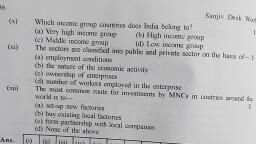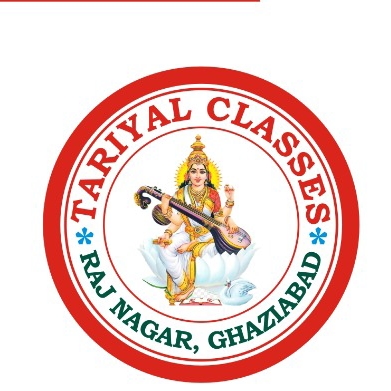Question 1 :
The common difference of the A.P. $3, 5, 7,....$ is _________.
Question 3 :
The last term of the AP $21, 18, 15$ ....... is $-351$. Find the nth term.
Question 4 :
Find the $8^{th}$ term of the A.P. : $11, 14, 17, 20.....$<br/>
Question 5 :
For an A.P., the seventh term is 19 and the thirteenth term is 37. Find its twenty second term.<br>
Question 6 :
<span>Find the sum of the following APs: </span>$-37, -33, -29, .....$ to $12$ terms
Question 8 :
<div><span>Check if the series is an A.P. Find the common difference $d$ and write three more terms of the the following series.</span><br/></div>$2,\displaystyle\frac{5}{2}$, $3,\displaystyle\frac{7}{2}, ...$
Question 10 :
The first term and the common difference of the arithmetic progression $3,10,17,24,...$ is?
Question 11 :
Is $-150$ a term of the $A.P$ : $11, 8, 5, 2$ ?
Question 12 :
Check whether $-150$ is a term of the AP:<br/>$11, 8, 5, 2,...$
Question 13 :
A property valued at Rs. 30000 will depreciate Rs. 1380 the first year, Rs. 1340 the second year, Rs. 1300 the third year, and so on. What will the depreciation during the eight year?<br>
Question 14 :
The $11th$ term of AP whose $3rd$ term is $11$ and $8th$ term is $26$ is
Question 16 :
Find the twenty fifth term of the A.P. : 12, 16, 20, 24, ..........
Question 17 :
The sum of 2 + 4 + 6 + 8 + .......... + 80 is :
Question 18 :
What is the sum of $t_n= (2n-5)$ from n =10 to 150?<br/>
Question 20 :
Which term of the sequence $-7, -2, 3, 8,.........$ is $73$?
Question 21 :
The $4^{th}$ term of an AP is $14$ and its $12^{th}$ term is $70$. What is its first term?
Question 22 :
If $ 5, k, 11$ are in $AP,$ then the value of $k$ is
Question 23 :
Find the number of terms in the sequence$:\ 4,\ 12,\ 20,\ .\ .\ .\ 108$
Question 24 :
<span>Find the sum of the following APs: </span>$2, 7, 12, ......,$ to $10$ terms
Question 25 :
Find the common difference in the series: 0.2, 0.9, 1.6 ..............
Question 26 :
Which of the following is not in the form of A.P.?<br>
Question 27 :
Find 11th term of the A.P. : -3, 1, 5, ........
Question 28 :
If the $n$th term of an A.P is $2n+3$, then sum of first $n$ term of the A.P is
Question 29 :
If $a, b$ and $c$ arc in arithmetic progression then $\dfrac{b- a}{c - b}$ is equal to
Question 31 :
Find the nth term of an arithmetic sequence $11, 22, 33, 44...$.<br/>
Question 32 :
Chose the correct option for the following sequence:<br/>$-25, -23, -21, -19..$
Question 33 :
<span>In an AP, the $9th$ term is $-72$. The $10th$ term is $60$ less than the $4th$ term. Find the first term of the AP</span>
Question 34 :
<span>The first term of an AP is $-50$ and the $50th$ term is $48$. Find the common difference</span>
Question 35 :
Find the number of terms of the A.P $-12,-9,-6,.....,21$. If $1$ is added to each term of this A.P., then find the sum of all terms of the A.P thus obtained.
Question 37 :
<span>The sum of n terms of an arithmetic sequence can be calculated by ......................... </span>
Question 38 :
$\sqrt{8},\sqrt{18},\sqrt{32}$ are in AP. Find the next term and common difference.
Question 41 :
If $\displaystyle \frac{6}{5},$ $a,4$ are in AP, the value of $a$ is
Question 42 :
Find the number of terms in an A.P: $-1,\ -5,\ -9,\ ..,\ - 197$
Question 43 :
A train can travel $200$ m in the first hour, $400$ m the next hour, $600$ m the third hour and so on in an arithmetic sequence. What is the total distance the train travels in $5$ hours?
Question 44 :
If $k, 2k -1$ and $2k + 1$ are three consecutive terms as an $A.P.$ then find the value of $k$.
Question 45 :
The $31st$ term of the AP whose first two terms are respectively $-2$ and $-7$ is
Question 46 :
Is it an AP?<br/><br/>$1, 4, 7, 10, 13, 16, 19, 22, 25, ...$<span></span>
Question 48 :
In an Arithmetic sequence, $S_{n}$ represents the sum to $n$ terms, what is $S_{n} - S_{n - 1}$?
Question 50 :
The nth term of the A.P. $3, 7, 11, 15, ....$ is given by -<br/>


























